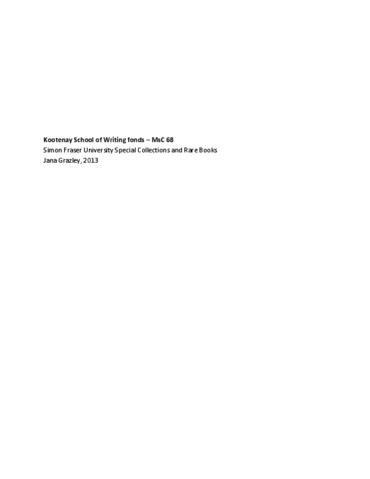Title and statement of responsibility area
Title proper
Kootenay School of Writing fonds
General material designation
- Textual records
- Sound recordings
Parallel title
Other title information
Title statements of responsibility
Title notes
- Source of title proper: Title is based on the provenance of the fonds.
Level of description
Fonds
Reference code
Edition area
Edition statement
Edition statement of responsibility
Class of material specific details area
Statement of scale (cartographic)
Statement of projection (cartographic)
Statement of coordinates (cartographic)
Statement of scale (architectural)
Issuing jurisdiction and denomination (philatelic)
Dates of creation area
Date(s)
-
1984-2006 (Creation)
- Creator
- Kootenay School of Writing
Physical description area
Physical description
1.89 m of textual records
84 photographs: prints
51 photographs: negatives
376 audio cassettes
9 audio discs
1 computer disk
Publisher's series area
Title proper of publisher's series
Parallel titles of publisher's series
Other title information of publisher's series
Statement of responsibility relating to publisher's series
Numbering within publisher's series
Note on publisher's series
Archival description area
Name of creator
Administrative history
The Kootenay School of Writing (KSW) grew out of the creative writing program at David Thompson University Centre (DTUC), Nelson, British Columbia. Established in 1979, the program ended when DTUC closed in 1984 following budget cuts by the provincial government. A collective of former DTUC instructors and students organized under the name the Kootenay School of Writing, and began to offer writing courses in Vancouver in the fall of 1984 and Nelson in the fall of 1985. Colin Browne and Fred Wah, both former DTUC writing program coordinators, were chosen to head the Vancouver and Nelson programs respectively, and the Kootenay School of Writing was incorporated as a non-profit society in September 1984.
Following the collaborative and non-hierarchical ethos of the DTUC program, the Kootenay School of Writing operated using a volunteer-based collective structure, with the role of the Board of Directors being largely symbolic; administrative decision-making was shared among collective members. Initially, the primary activities of KSW were focused around education, but readings also constituted a significant part of programming. Two colloquia organized by KSW – New Poetics (1985) and Split/Shift (1986) – brought writers from across Canada and the United States to Vancouver, and emphasized KSW’s interest in the intersections of language, politics, and class. Over time, the focus of KSW’s activities shifted from courses to events.
Through the 1990s, KSW experienced difficulty maintaining financial stability. Conflict arose amongst members as to whether the School should undertake administrative re-structuring, transitioning to a more formal organizational structure with designated roles and responsibilities. Comprehensive re-structuring was ultimately abandoned in favour of creating a part-time administrative position, which was filled by collective members on a rotating basis. The City of Vancouver withdrew its operating grant for KSW for the 1998 fiscal year, giving rise to various fundraising activities, including a benefit reading by Michael Ondaatje.
The Kootenay School of Writing continues to function as a hub for avant-garde poetry in Vancouver. In 2008 a third major conference, the Positions Colloquium, brought numerous poets from across North America to Vancouver for five days of readings, discussions, performances, etc. At the time of writing (Summer 2013), however, the future of the organization is uncertain.
Custodial history
The fonds was held by the Kootenay School of Writing collective until the bulk of the material was transferred to Simon Fraser University Special Collections and Rare Books in 2004. Remaining material was donated by KSW collective members in subsequent years.
Scope and content
Fonds consists of the administrative records of the School, copies of communications and promotional materials, and audio recordings of talks and readings. Records in the fonds include correspondence, grant applications, collective meeting minutes, budgets and annual financial reports. Communications and promotional materials include press releases, brochures, and posters.
Fonds is divided into seven series: Society administration (1984-2003); Office administration (1984-2003); Financial records (1984-2006); Programming (1984-2002); Publicity (1984-1998); Professional associations and external organizations (1985-1995); and Audio recordings (1985-2006).
Notes area
Physical condition
Immediate source of acquisition
The majority of the material was purchased from the Kootenay School of Writing collective by Simon Fraser University Library, Special Collections and Rare Books in 2004. Remaining material was donated by KSW collective members in subsequent years.
Arrangement
Language of material
Script of material
Location of originals
Availability of other formats
Restrictions on access
Terms governing use, reproduction, and publication
Finding aids
Finding aid
Associated materials
Related groups of records held at SFU Special Collections and Rare Books include the Jeff Derksen / Writing magazine fonds (MsC 105) and the Lisa Robertson fonds (MsC 38).
Accruals
Further accruals are expected.
General note
More information on the administrative history of KSW is available in Geoff Laurenson’s paper “The Kootenay School of Writing: History and Evolution of Administration, 1984 – 2012” (Appendix I in online finding aid).
Alternative identifier(s)
Standard number area
Standard number
Access points
Subject access points
Place access points
Name access points
- Kootenay School of Writing (Subject)
Genre access points
Control area
Description record identifier
Institution identifier
Rules or conventions
Rules for Archival Description
Status
Published
Level of detail
Full
Dates of creation, revision and deletion
Arranged and described by Jana Grazley in 2013.
Language of description
- English
Script of description
Sources
Digital object metadata
Filename
FINDING_AID_KSW.pdf
Latitude
Longitude
Media type
Text
Mime-type
application/pdf


